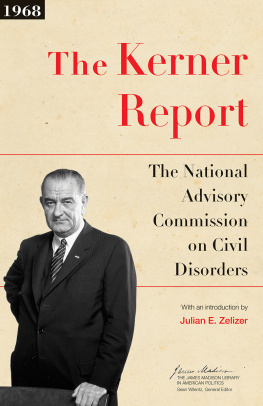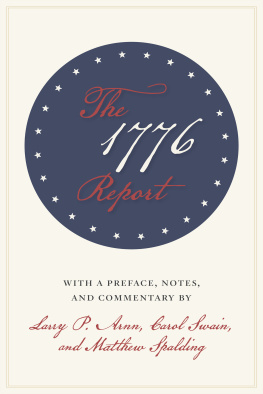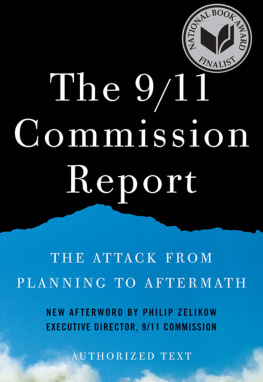The Kerner Report
THE JAMES MADISON LIBRARY
IN AMERICAN POLITICS
Sean Wilentz, General Editor
Margot Canaday, Kevin M. Kruse, and Julian E. Zelizer,
Series Advisory Board Members
The James Madison Library in American Politics of the Princeton University Press is devoted to reviving important American political writings of the recent and distant past. American politics has produced an abundance of important worksproclaiming ideas, describing candidates, explaining the inner workings of government, and analyzing political campaigns. This literature includes partisan and philosophical manifestos, pamphlets of practical political theory, muckraking exposs, autobiographies, on-the-scene reportage, and more. The James Madison Library issues fresh editions of both classic and now-neglected titles that helped shape the American political landscape. Up-to-date commentaries in each volume by leading scholars, journalists, and political figures make the books accessible to modern readers.
The Conscience of a Conservative by Barry M. Goldwater
The New Industrial State by John Kenneth Galbraith
Liberty and the News by Walter Lippmann
The Politics of Hope and The Bitter Heritage: American Liberalism in the 1960s by Arthur M. Schlesinger, Jr.
Richard Nixon: Speeches, Writings, Documents edited and introduced by Rick Perlstein
The Emerging Republican Majority by Kevin Phillips
The Kerner Report by the National Advisory Commission on Civil Disorders
The Kerner Report
The National Advisory Commission on Civil Disorders
With an introduction by Julian E. Zelizer
PRINCETON UNIVERSITY PRESS
PRINCETON AND OXFORD
Proofreading, composition, and indexing of this 2016 Princeton University Press edition copyright 2016 by Princeton University Press
Introductions to the 2016 Edition copyright 2016 by
Princeton University Press
No copyright is claimed for the original publication of the 1968 Kerner
Report of the United States government
Requests for permission to reproduce material from this work should be sent to Permissions, Princeton University Press
Published by Princeton University Press, 41 William Street, Princeton,
New Jersey 08540
In the United Kingdom: Princeton University Press, 6 Oxford Street,
Woodstock, Oxfordshire OX20 1TR
press.princeton.edu
Cover photograph: Lyndon B. Johnson in the Oval Office, March 10, 1964.
Courtesy of the Lyndon Baines Johnson Library and Museum.
All Rights Reserved
Library of Congress Control Number 2016930080
Cloth ISBN 978-0-691-17424-2
Paperback ISBN 978-0-691-16937-8
British Library Cataloging-in-Publication Data is available
This book has been composed in Minion Pro and Ideal Sans
Printed on acid-free paper.
Printed in the United States of America
10 9 8 7 6 5 4 3 2 1
The only genuine, long-range solution for what has happened lies in an attackmounted at every levelupon the conditions that breed despair and violence. All of us know what those conditions are: ignorance, discrimination, slums, poverty, disease, not enough jobs. We should attack these conditionsnot because we are frightened by conflict, but because we are fired by conscience. We should attack them because there is simply no other way to achieve a decent and orderly society in America.
LYNDON BAINES JOHNSON, ADDRESS TO THE NATION, JUNE 27, 1967
Contents
Sean Wilentz |
Julian E. Zelizer |
General Editors Introduction
The Kerner Commission report is a fundamental document of the American 1960s. In August 1965, only five days after President Lyndon B. Johnson signed into law the historic Voting Rights Act, a violent incident involving white police and local residents in the black neighborhood of Watts, Los Angeles, touched off five days of rioting that left thirty-four dead, a thousand injured, and $40 million in property damage. Thereafter, clashes between police and black citizens ignited explosions in cities around the country: eleven major riots in the summer of 1966 and twenty-five major riots a year later, including the decades worst, in Detroit, which left forty-three dead. What had become, earlier in the decade, a remarkable liberal political consensus on racial justice shattered: whereas in 1964 a majority of Northern whites supported President Johnsons ambitious civil rights program, by 1966 a majority believed the government was pushing too hard for racial integration.
The political impact was devastating for the increasingly beleaguered Johnson. In the 1966 midterm elections, Republicans made major inroads in the white South and the blue-collar North and picked up enough seats in the House to ruin the liberal working majority in Congress that had passed LBJs landmark civil rights and Great Society legislation. Already in political trouble over his dramatic escalation of American military involvement in Vietnam, Johnson found himself caught in a political vise, as racial unrest fed both resurgence on the right and radicalizing frustration on the left. Groping for some political leverageand with Michigan National Guardsmen still deployed in the streets of DetroitJohnson announced to the nation on July 27, 1967, the formation, by executive order, of the National Advisory Commission on Civil Disorders, to be chaired by former Illinois governor Otto Kerner.
Official investigations into the causes of violent unrest were familiar enough in American history. In 1871, a joint select committee of Congress held hearings on the terrorist activities of the Ku Klux Klan in the Reconstruction South; thereafter, from the bloody labor battles in Homestead, Pennsylvania, in 1892, through the racial strife in Detroit in 1943 that seemed a precursor of the 1960s, American violence had become the subject of a small library of authoritative fact-finding testimony. Less than four years before he formed the Kerner Commission, Johnson had had to appoint the Warren Commission to investigate the assassination of John F. Kennedy and, he hoped, dispel suspicions of a conspiracy in the murder. But the Kerner inquiry would prove singular, for intellectual as well as political reasons. As never before, the rising prestige and ambitions of the social sciences had created an impression that the underlying causes of social disorder could be discovered with dispassionate clarity. Just as modern-day economics could (supposedly) tame the destructive boom-and-bust cycles of advanced industrial capitalism, so sociology and its attendant fields could (supposedly) get to the roots of urban racial strife. With enough hard work and political will, those findings could yield effective public policy.
But as Julian Zelizer explains in his introduction to this James Madison Library edition of the Kerner Commission report, conceits about the social sciences collapsed amid the turbulence of the post-Watts years. The fragmentation of the liberal consensus on race had overtaken the worlds of academe and policymaking. Inside the Kerner Commission, some experts and analysts conceived of the violent outbreaks not as signs of oppressive poverty and social breakdown but as righteous political protests against racist institutions, in particular the police. The events in Watts, Detroit, and elsewhere were not riots, these analysts claimed, they were rebellions; instead of seeking to quell the outrage in the nations inner cities, responsible government officials needed to awaken to the racism so deeply and systematically entrenched in American life, and then attack it head-on.











